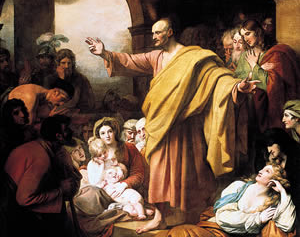The Feast of Sts. Peter & Paul
 “Self” Magazine is certainly a sign of the times. This is an age when it is socially acceptable to admit that life is all about me.
“Self” Magazine is certainly a sign of the times. This is an age when it is socially acceptable to admit that life is all about me.
But selfishness is nothing new. Ever since Eve bit into the apple, human beings have made the choice to dethrone God and put in His place the unholy trinity of me, myself, and I.
But Jesus commands us to “love thy neighbor as thyself.” Doesn’t this imply that love of self is OK, even required?
Absolutely. God placed in us a drive towards self-preservation. He made beneficial activities, like eating, pleasurable. And he made destructive activities painful.
But He also gave us intellect and will so that we are not driven simply by instinct, as are the animals. So the ancient enemy of humanity does his best to deceive our intellect into thinking that what is destructive is actually good for us. And he entices us to use our will to choose these destructive things contrary to God’s commandments. The end justifies the means, he argues, and so if we have to trample over others and defy God to get what we want, so be it.
This is the kind of self-love that Jesus condemns (Matthew 10:37-42). It leads to ruin, confusion, and emptiness. There is no way to tame this or to fit religion into it. The only solution is to kill it. In baptism, this old egocentric self is crucified and buried with Christ (Romans 6:11). The man who wrote this line, Saul of Tarsus, knew what he was talking about. The about-face required of him was radical, turning him from persecutor to persecuted, agent of hatred to apostle of love. There can only be one Lord–Jesus or me.
Accepting Jesus means allowing Him to be boss, allowing Him to call the shots and direct my steps. Picking up the cross and following Him (Matthew 16:24-25) means accepting the Father’s will, even where it “crosses” my will, even when it leads to suffering. This is the meaning of Jesus’ words to Peter “as a young man you fastened your belt and went about as you pleased, but when you are older, you will stretch out your hands and another will tie you fast and carry you off against your will” (John 21:18). When Jesus had finished saying this, he looked at Peter and said “Follow me.”
As we celebrate the Solemnity of Sts. Peter and Paul, let us recall that before these saints were shepherds and apostles, they were sheep and disciples. God was able to do great things in them and through them because they made a decision to surrender control of their lives and destiny to the Son of Man who is also the Son of God.
Jesus says “follow me” to each of us. It may mean making a change of career. It may mean breaking off a relationship that is leading us away from Christ. Or it may just mean doing what we are already doing but for an entirely different reason . . .achieving great things not to draw attention to ourselves, but to glorify Christ . . . seeking an intimate relationship no longer to take but to give. . . working not for the weekend, but for the kingdom.

